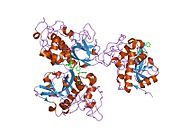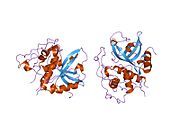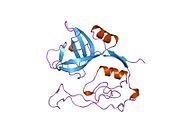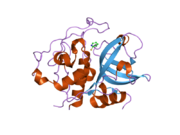Cathepsin B
Cathepsin B belongs to a family of lysosomal cysteine proteases known as the cysteine cathepsins and plays an important role in intracellular proteolysis.[5] In humans, cathepsin B is encoded by the CTSB gene.[6][7] Cathepsin B is upregulated in certain cancers, in pre-malignant lesions, and in various other pathological conditions.[8][9][10][11]
Structure
[edit]Gene
[edit]The CTSB gene is located at chromosome 8p22, consisting of 13 exons. The promoter of CTSB gene contains a GC-rich region including many SP1 sites, which is similar to housekeeping genes.[12] At least five transcript variants encoding the same protein have been found for this gene.[13]
Protein
[edit]Cathepsin B is synthesized on the rough endoplasmic reticulum as a preproenzyme of 339 amino acids with a signal peptide of 17 amino acids.[14][15] Procathepsin B of 43/46 kDa is then transported to the Golgi apparatus, where cathepsin B is formed. Mature cathepsin B is composed of a heavy chain of 25-26 kDa and a light chain of 5kDa, which are linked by a dimer of disulfide.
Function
[edit]Cathepsin B may enhance the activity of other proteases, including matrix metalloproteinase, urokinase (serine protease urokinase plasminogen activator), and cathepsin D,[16][17] and thus it has an essential position for the proteolysis of extracellular matrix components, intercellular communication disruption, and reduced protease inhibitor expression.[11]
Cells may become carcinogenic when cathepsin B is unregulated.[18]
Potential in disease
[edit]Cathepsin B has been proposed as a potentially effective biomarker for a variety of cancers.[16][19] Overexpression of cathepsin B is correlated with invasive and metastatic cancers.[20]
Cathepsin B has been shown to be involved in the pathogenesis of pancreatitis, by prematurely activating the digestive enzyme trypsinogen within the pancreas, leading to autodigestion of acinar cells.[21][22][23]
Interactions
[edit]Cathepsin B has been shown to interact with:
Cathepsin B is inhibited by:
See also
[edit]References
[edit]- ^ a b c ENSG00000285132 GRCh38: Ensembl release 89: ENSG00000164733, ENSG00000285132 – Ensembl, May 2017
- ^ a b c GRCm38: Ensembl release 89: ENSMUSG00000021939 – Ensembl, May 2017
- ^ "Human PubMed Reference:". National Center for Biotechnology Information, U.S. National Library of Medicine.
- ^ "Mouse PubMed Reference:". National Center for Biotechnology Information, U.S. National Library of Medicine.
- ^ Sloane BF (April 1990). "Cathepsin B and cystatins: evidence for a role in cancer progression". Seminars in Cancer Biology. 1 (2): 137–52. PMID 2103490.
- ^ Chan SJ, San Segundo B, McCormick MB, Steiner DF (October 1986). "Nucleotide and predicted amino acid sequences of cloned human and mouse preprocathepsin B cDNAs". Proceedings of the National Academy of Sciences of the United States of America. 83 (20): 7721–5. Bibcode:1986PNAS...83.7721C. doi:10.1073/pnas.83.20.7721. PMC 386793. PMID 3463996.
- ^ Cao L, Taggart RT, Berquin IM, Moin K, Fong D, Sloane BF (February 1994). "Human gastric adenocarcinoma cathepsin B: isolation and sequencing of full-length cDNAs and polymorphisms of the gene". Gene. 139 (2): 163–9. doi:10.1016/0378-1119(94)90750-1. PMID 8112600.
- ^ Tong B, Wan B, Wei Z, Wang T, Zhao P, Dou Y, Lv Z, Xia Y, Dai Y (September 2014). "Role of cathepsin B in regulating migration and invasion of fibroblast-like synoviocytes into inflamed tissue from patients with rheumatoid arthritis". Clinical and Experimental Immunology. 177 (3): 586–97. doi:10.1111/cei.12357. PMC 4137842. PMID 24749816.
- ^ Lai WF, Chang CH, Tang Y, Bronson R, Tung CH (March 2004). "Early diagnosis of osteoarthritis using cathepsin B sensitive near-infrared fluorescent probes". Osteoarthritis and Cartilage. 12 (3): 239–44. doi:10.1016/j.joca.2003.11.005. PMID 14972341.
- ^ Ha SD, Ham B, Mogridge J, Saftig P, Lin S, Kim SO (January 2010). "Cathepsin B-mediated autophagy flux facilitates the anthrax toxin receptor 2-mediated delivery of anthrax lethal factor into the cytoplasm". The Journal of Biological Chemistry. 285 (3): 2120–9. doi:10.1074/jbc.M109.065813. PMC 2804368. PMID 19858192.
- ^ a b Yang WE, Ho CC, Yang SF, Lin SH, Yeh KT, Lin CW, Chen MK (2016). "Cathepsin B Expression and the Correlation with Clinical Aspects of Oral Squamous Cell Carcinoma". PLOS ONE. 11 (3): e0152165. Bibcode:2016PLoSO..1152165Y. doi:10.1371/journal.pone.0152165. PMC 4816521. PMID 27031837.
- ^ Qian F, Frankfater A, Chan SJ, Steiner DF (April 1991). "The structure of the mouse cathepsin B gene and its putative promoter". DNA and Cell Biology. 10 (3): 159–68. doi:10.1089/dna.1991.10.159. PMID 2012677.
- ^ "Entrez Gene: CTSB cathepsin B".
- ^ Kirschke H, Barrett AJ, Rawlings ND (1995). "Proteinases 1: lysosomal cysteine proteinases". Protein Profile. 2 (14): 1581–643. PMID 8771190.
- ^ Mort JS, Buttle DJ (May 1997). "Cathepsin B". The International Journal of Biochemistry & Cell Biology. 29 (5): 715–20. doi:10.1016/s1357-2725(96)00152-5. PMID 9251238. S2CID 37767552.
- ^ a b Alapati K, Kesanakurti D, Rao JS, Dasari VR (May 2014). "uPAR and cathepsin B-mediated compartmentalization of JNK regulates the migration of glioma-initiating cells". Stem Cell Research. 12 (3): 716–29. doi:10.1016/j.scr.2014.02.008. PMC 4061617. PMID 24699410.
- ^ Vigneswaran N, Zhao W, Dassanayake A, Muller S, Miller DM, Zacharias W (August 2000). "Variable expression of cathepsin B and D correlates with highly invasive and metastatic phenotype of oral cancer". Human Pathology. 31 (8): 931–7. doi:10.1053/hupa.2000.9035. PMID 10987253.
- ^ Aggarwal, Neha; Sloane, Bonnie F. (June 2014). "Cathepsin B: Multiple roles in cancer". Proteomics. Clinical Applications. 8 (5–6): 427–437. doi:10.1002/prca.201300105. ISSN 1862-8346. PMC 4205946. PMID 24677670.
- ^ Bian B, Mongrain S, Cagnol S, Langlois MJ, Boulanger J, Bernatchez G, Carrier JC, Boudreau F, Rivard N (May 2016). "Cathepsin B promotes colorectal tumorigenesis, cell invasion, and metastasis". Molecular Carcinogenesis. 55 (5): 671–87. doi:10.1002/mc.22312. PMC 4832390. PMID 25808857.
- ^ Ruan J, Zheng H, Rong X, Rong X, Zhang J, Fang W, Zhao P, Luo R (20 February 2016). "Over-expression of cathepsin B in hepatocellular carcinomas predicts poor prognosis of HCC patients". Molecular Cancer. 15: 17. doi:10.1186/s12943-016-0503-9. PMC 4761221. PMID 26896959.
- ^ Saluja, Ashok; Dudeja, Vikas; Dawra, Rajinder; Sah, Raghuwansh P. (May 2019). "Early Intra-Acinar Events in Pathogenesis of Pancreatitis". Gastroenterology. 156 (7): 1979–1993. doi:10.1053/j.gastro.2019.01.268.
- ^ Hirota, Masahiko; Ohmuraya, Masaki; Hashimoto, Daisuke; Suyama, Koichi; Sugita, Hiroki; Ogawa, Michio (April 2020). "Roles of Autophagy and Pancreatic Secretory Trypsin Inhibitor in Trypsinogen Activation in Acute Pancreatitis". Pancreas. 49 (4): 493–497. doi:10.1097/MPA.0000000000001519.
- ^ Reinheckel, T.; Deussing, J.; Roth, W.; Peters, C. (5 May 2001). "Towards Specific Functions of Lysosomal Cysteine Peptidases: Phenotypes of Mice Deficient for Cathepsin B or Cathepsin L". Biological Chemistry. 382 (5): 735–741. doi:10.1515/BC.2001.089.
- ^ van der Stappen JW, Williams AC, Maciewicz RA, Paraskeva C (August 1996). "Activation of cathepsin B, secreted by a colorectal cancer cell line requires low pH and is mediated by cathepsin D". International Journal of Cancer. 67 (4): 547–54. doi:10.1002/(SICI)1097-0215(19960807)67:4<547::AID-IJC14>3.0.CO;2-4. PMID 8759615.
- ^ a b Pavlova A, Björk I (September 2003). "Grafting of features of cystatins C or B into the N-terminal region or second binding loop of cystatin A (stefin A) substantially enhances inhibition of cysteine proteinases". Biochemistry. 42 (38): 11326–33. doi:10.1021/bi030119v. PMID 14503883.
- ^ Estrada S, Nycander M, Hill NJ, Craven CJ, Waltho JP, Björk I (May 1998). "The role of Gly-4 of human cystatin A (stefin A) in the binding of target proteinases. Characterization by kinetic and equilibrium methods of the interactions of cystatin A Gly-4 mutants with papain, cathepsin B, and cathepsin L". Biochemistry. 37 (20): 7551–60. doi:10.1021/bi980026r. PMID 9585570.
- ^ Pol E, Björk I (September 2001). "Role of the single cysteine residue, Cys 3, of human and bovine cystatin B (stefin B) in the inhibition of cysteine proteinases". Protein Science. 10 (9): 1729–38. doi:10.1110/ps.11901. PMC 2253190. PMID 11514663.
- ^ Mai J, Finley RL, Waisman DM, Sloane BF (April 2000). "Human procathepsin B interacts with the annexin II tetramer on the surface of tumor cells". The Journal of Biological Chemistry. 275 (17): 12806–12. doi:10.1074/jbc.275.17.12806. PMID 10777578.
- ^ Hurley EA, Thorley-Lawson DA (December 1988). "B cell activation and the establishment of Epstein-Barr virus latency". The Journal of Experimental Medicine. 168 (6): 2059–75. doi:10.1084/jem.168.6.2059. PMC 2189139. PMID 2848918.
- ^ Murata M, Miyashita S, Yokoo C, Tamai M, Hanada K, Hatayama K, Towatari T, Nikawa T, Katunuma N (March 1991). "Novel epoxysuccinyl peptides. Selective inhibitors of cathepsin B, in vitro". FEBS Letters. 280 (2): 311–15. doi:10.1016/0014-5793(91)80318-w. PMID 2013328. S2CID 46523390.
Further reading
[edit]External links
[edit]- The MEROPS online database for peptidases and their inhibitors: C01.060
- Cathepsin+B at the U.S. National Library of Medicine Medical Subject Headings (MeSH)
















